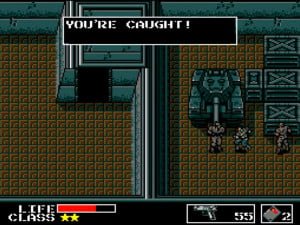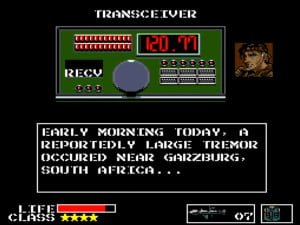From: Blake Foley
To: Sean Gandert
Subject: RE: Stop the Operation. Switch off Your MSX at Once.
 Man, Bioshock’s twist… I really hate that it is THE twist in video games, and I equally hate the popular video game trope that it’s built upon. Bioshock’s twist is a classic “gotcha” that a lot of games love to implement. “You’ve been helping me this whole time! Mwahahaha!” states the villain “Don’t you feel foolish?” While the trope can work in other mediums like literature, television, or film, the player’s role in a game makes it a problem. If I were to guess the twist in a film, I have the satisfaction of knowing I put together something the protagonist didn’t. In a game, the protagonist is almost always an extension of myself, and I often have only one choice if I see the “gotcha” twist coming… to turn off the game. Metal Gear not only avoids the “You’ve been helping me this whole time” trope with its twist, it manages to subvert it wonderfully, even if it was likely unintentional. It knows full well you aren’t going to quit the game. Who would? (I actually am curious if anybody playing the original game in the 80s listened to Big Boss and switched off the system). The game assumes you will keep playing, and it is the only assumption it makes about the player. A twist like Bioshock’s assumes you don’t see it coming. Admittedly, I didn’t, but it’s still ultimately a cheat when it’s thrust upon you. I agree, Big Boss’ plan was full of holes, but the way the game contextualized and executed his plan made the twist satisfying in a way Bioshock’s never could be. Turn off Bioshock, you win. Turn off Metal Gear, Big Boss wins. Hideo Kojima is fully aware that he is making a video game, and he embraces it, turning the medium’s limitations into something special.
Man, Bioshock’s twist… I really hate that it is THE twist in video games, and I equally hate the popular video game trope that it’s built upon. Bioshock’s twist is a classic “gotcha” that a lot of games love to implement. “You’ve been helping me this whole time! Mwahahaha!” states the villain “Don’t you feel foolish?” While the trope can work in other mediums like literature, television, or film, the player’s role in a game makes it a problem. If I were to guess the twist in a film, I have the satisfaction of knowing I put together something the protagonist didn’t. In a game, the protagonist is almost always an extension of myself, and I often have only one choice if I see the “gotcha” twist coming… to turn off the game. Metal Gear not only avoids the “You’ve been helping me this whole time” trope with its twist, it manages to subvert it wonderfully, even if it was likely unintentional. It knows full well you aren’t going to quit the game. Who would? (I actually am curious if anybody playing the original game in the 80s listened to Big Boss and switched off the system). The game assumes you will keep playing, and it is the only assumption it makes about the player. A twist like Bioshock’s assumes you don’t see it coming. Admittedly, I didn’t, but it’s still ultimately a cheat when it’s thrust upon you. I agree, Big Boss’ plan was full of holes, but the way the game contextualized and executed his plan made the twist satisfying in a way Bioshock’s never could be. Turn off Bioshock, you win. Turn off Metal Gear, Big Boss wins. Hideo Kojima is fully aware that he is making a video game, and he embraces it, turning the medium’s limitations into something special.
 I’ve been thinking a lot about Kojima’s story revisions, and I think I’m with you. I get nervous whenever an artist revisits their work, but I think he handles it well. The original Metal Gear was made during a time when video game storytelling was in its infancy and translations were generally awful (just look at the NES Metal Gear translation). Steve, a part of the game that you and I love, was completely removed from the MSX2 version’s English translation. He’d be lost to us if it weren’t for the revision, and we wouldn’t be here dreaming of a game starring that reluctant revolutionary. I end up thinking of this new version as a restoration rather than a rewrite, and I’d probably take bigger issue with a modern remake of Metal Gear because it would inevitably start to take a shape that was never intended for the original. As I reflect on the series, I’m realizing that Kojima never outright changes anything when he looks back at his older games, and Metal Gear script’s revision is no exception. But that doesn’t mean they’re not modernized to work with the story he’s currently trying to tell. Did you notice the second explosion at the end of Metal Gear? I kinda doubt Kojima had a reason for it at the time, but you’ll find moving forward that he loves to look back at his previous work and offer a reason where there previously was none.
I’ve been thinking a lot about Kojima’s story revisions, and I think I’m with you. I get nervous whenever an artist revisits their work, but I think he handles it well. The original Metal Gear was made during a time when video game storytelling was in its infancy and translations were generally awful (just look at the NES Metal Gear translation). Steve, a part of the game that you and I love, was completely removed from the MSX2 version’s English translation. He’d be lost to us if it weren’t for the revision, and we wouldn’t be here dreaming of a game starring that reluctant revolutionary. I end up thinking of this new version as a restoration rather than a rewrite, and I’d probably take bigger issue with a modern remake of Metal Gear because it would inevitably start to take a shape that was never intended for the original. As I reflect on the series, I’m realizing that Kojima never outright changes anything when he looks back at his older games, and Metal Gear script’s revision is no exception. But that doesn’t mean they’re not modernized to work with the story he’s currently trying to tell. Did you notice the second explosion at the end of Metal Gear? I kinda doubt Kojima had a reason for it at the time, but you’ll find moving forward that he loves to look back at his previous work and offer a reason where there previously was none.
I don’t have a lot left to say about Metal Gear beyond that, at least not right now. I’m sure we’ll find a reason to bring it up again down the road, but I’m ready to move on to the next game. Before we start Metal Gear 2, though, I wanted to point out one amusing thing that didn’t really fit anywhere else.
I recently looked up Diane in the database that was released on PS3 alongside Metal Gear Solid 4: Guns of the Patriots and found her bio to pretty wonderful. It turns out she was the lead vocalist for a positive punk band called Thin Wall before joining Outer Heaven and the resistance. That is the kind of random weirdness that keeps me coming back to the series. I wonder if Steve had a similar role in her life during her punk rock days? Maybe the Steve adventure game could start there?
Anyway, lets move on. It is time for Metal Gear 2: Solid Snake, the 1990 sequel to Metal Gear that didn’t get an English translation until 2006, when it was released as part of Metal Gear Solid 3: Subsistence. See you in Zanzibar Land.
-Blake
Metal Gear (1987) – MSX2- Metal Gear 2: Solid Snake (1990) – MSX2
- Metal Gear Solid (1998) – PlayStation
- Metal Gear Solid 2: Sons of Liberty (2001) – PlayStation 2
- Metal Gear Solid 3: Snake Eater (2004) – PlayStation 2
- Metal Gear Solid 4: Guns of the Patriots (2008) – PlayStation 3
- Metal Gear Solid: Peace Walker (2010) – PlayStation Portable
- Metal Gear Rising: Revengeance (2013) – PlayStation 3, Xbox 360
- Metal Gear Solid V: Ground Zeroes (2014) – PlayStation 4, Xbox One
- Metal Gear Solid V: The Phantom Pain (2015) – PlayStation 4, Xbox One





